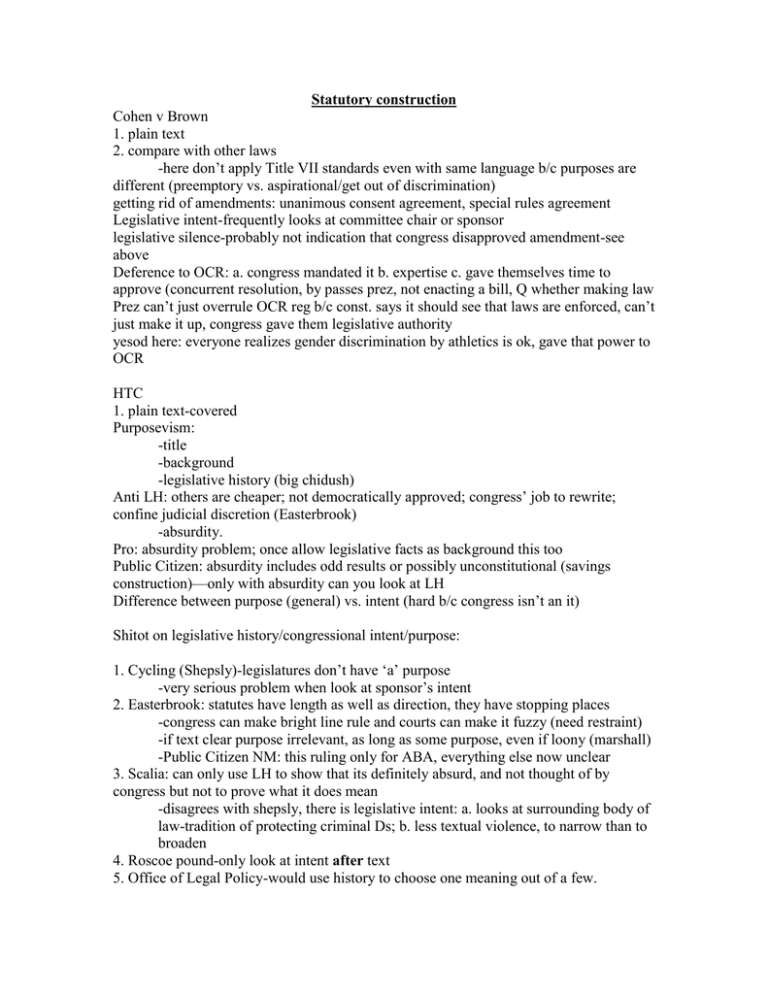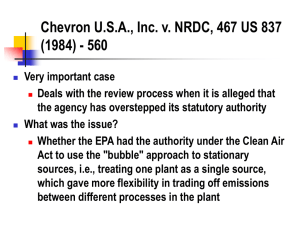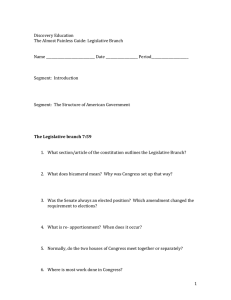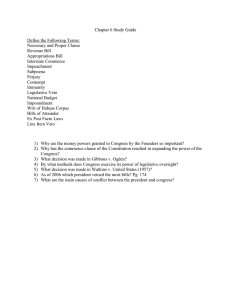Statutory construction Cohen v Brown 1. plain text 2. compare with other laws
advertisement

Statutory construction Cohen v Brown 1. plain text 2. compare with other laws -here don’t apply Title VII standards even with same language b/c purposes are different (preemptory vs. aspirational/get out of discrimination) getting rid of amendments: unanimous consent agreement, special rules agreement Legislative intent-frequently looks at committee chair or sponsor legislative silence-probably not indication that congress disapproved amendment-see above Deference to OCR: a. congress mandated it b. expertise c. gave themselves time to approve (concurrent resolution, by passes prez, not enacting a bill, Q whether making law Prez can’t just overrule OCR reg b/c const. says it should see that laws are enforced, can’t just make it up, congress gave them legislative authority yesod here: everyone realizes gender discrimination by athletics is ok, gave that power to OCR HTC 1. plain text-covered Purposevism: -title -background -legislative history (big chidush) Anti LH: others are cheaper; not democratically approved; congress’ job to rewrite; confine judicial discretion (Easterbrook) -absurdity. Pro: absurdity problem; once allow legislative facts as background this too Public Citizen: absurdity includes odd results or possibly unconstitutional (savings construction)—only with absurdity can you look at LH Difference between purpose (general) vs. intent (hard b/c congress isn’t an it) Shitot on legislative history/congressional intent/purpose: 1. Cycling (Shepsly)-legislatures don’t have ‘a’ purpose -very serious problem when look at sponsor’s intent 2. Easterbrook: statutes have length as well as direction, they have stopping places -congress can make bright line rule and courts can make it fuzzy (need restraint) -if text clear purpose irrelevant, as long as some purpose, even if loony (marshall) -Public Citizen NM: this ruling only for ABA, everything else now unclear 3. Scalia: can only use LH to show that its definitely absurd, and not thought of by congress but not to prove what it does mean -disagrees with shepsly, there is legislative intent: a. looks at surrounding body of law-tradition of protecting criminal Ds; b. less textual violence, to narrow than to broaden 4. Roscoe pound-only look at intent after text 5. Office of Legal Policy-would use history to choose one meaning out of a few. 6. Majority view: can use LH to explain, but can’t go against canons/settled usage 7. Posner: pragmatic going into intent practically, judges can enrich law w/ moral values of society, don’t make congress’ work an embarrassment to them and to us 8. HTC-can’t use title to go against text, but LH seems to be ok for that 9. Caminetti-LH/title can’t change plain meaning of words, there no absurdity just because affects consensual relations so allow -implicitly overruled in brown and williamson (need to look at statutory scheme/big picture even within plain text stage) ((‘other text’)) test: plain text-yes; no absurdity: if yes, enforce; if either no, look at title and LH textual canons Llewelyn-realism means there’s a constrained universe of correct views, use canons Grand v restrained (e’brook) style a. don’t go beyond text; b. consulted from beginning, like a dictionary/background info; c. lead to determinative results-just read carefully; d. canons on both sides? Stuck. if make one term broad, can’t leave another term with nothing to do Exceptions must be narrow construe similar terms similarly ejusdem degeneris-catch all phrase at end qualified by earlier terms words gather meaning from those around, each word must be connected each word needs to add something new (no surplusage) background rule (Green-criminal D) changes as little as possible (canon of conservation) 8. less violence to narrow than to broaden (bock laundry scalia) 9. endorse ordinary meaning unless long line of legal definition 10. qualifications only apply to last antecedent (last antecedent rule) 11. and/or canon: separate clauses are independent 12. limitations are to be narrowly construed 13. punctuation rule: comma preceding the proviso thrusts it upstream 14. in pari materia-reading different statutes similarly (n haven) 15. expresio unios 1. 2. 3. 4. 5. 6. 7. Substantive canons -can’t disregard language, but can understand statute by relying on something outside the text 1. rule of lenity (criminal version of ambiguity, if not clearly defined no crime) a. -no ambiguity if canons make statute clear, need dueling canons (mcnally) b. Purposes: a. notice; b. get prosecutors mad to complain to congress; c. federalism, congress takes over only in exceptions); d. liberty (“spirit of federalism”) 2. against implied repeals a. can trump plain text when exception invented by congress (mancari) 3. want everything to be coherent, read differently if not so (n. haven) 4. avoid serious constitutional Q unless clear congressional intent (catholic) a. –judges can’t balance; would need specific reference to schools b. Approach in catholic: just refer to canon; then strain to construe statute to not come into the Q (might over-enforce the constitution) c. overruled in smith-no violation if generally applicable law against religious institutions as long as purpose of enforcement isn’t to burden religious belief 5. Traditional state powers 6. Basic right of self-sovereignty to govern itself (Gregory)—also constitutional Q, avoid federal pushing to this category unless no choice 7. Implied preemption a. Conflict i. Impossibility ii. Obstacle 1. Stevens-need clear proof for preemption (like gregory) a. wins in bates-avoid unless clear i. States are more democratic ii. its first kind of legislative inaction: agency passed, congress did nothing, then introduced bill and no action; third-statute reenacted and no amendment introduced iii. N haven-can learn from second/third even if its not a proof b. congress would’ve mentioned getting rid of all trot litigation if they were doing that 2. Breyer-just conflicting purpose (they wanted a mix) (geier) a. effects based test b. Field-so much fed law didn’t want any deviation from scheme, if get rid of one part other parts might fail 8. Specific statutes beat general ones (morton v mancari) a. -can’t be nullified, like bock laundry, xtension of implied repeal b. based on idea that if can interpret to preserve both than do so 9. presume against formality for rulemaking, presume for formality for adjudication—distinction between legislative (no entitlements at stake) and quasi-judicial (past/due process)-NM for hearing on the record/OIRA review 10. presumption that policies will be carried out best if the settled rule is adhered to (state farm) 11. if agency has long standing interpretation, congressional inaction b/c of that interpretation, its implied acceptance of that interpretation) N haven-majority: other statutes only guide when we don’t have proof from this title itself; powell-language indicates receding was just to resolve inconsistency morton v mancari-without intent, need conflict, there is none here, can’t create a conflict Administrative agencies I. Non delegation doctrine A. to agency Ry comm. v chicago ry-denies court power to review rate determination --statute doesn’t contemplate review, congress can’t delegate legislative but difficult to discriminate between legislative and executive duties --delegation allowed when its under and in pursuance of the law, not to “make the law” -plus here legislature can’t deal and huge problem ALA Schechter-delegation not allowed since: a. positive, too broad b. no standards, both pro consumer (set prices) and pro workers (high wages) c. private parties control amalgamated meat cutters-allowed since specified standards, intelligible principle -ultimate standard of fairness and equity Benzene case-construes delegation narrowly b/c of un-cabined discretion to avoid Schechter (version of avoidance canon) based on unproven assumption that continually less sickness if keep going down, statute didn’t require absolutely risk-free workplace but just no significant risks agency has burden of proof 3 functions of non-delegation doctrine: a. orderly governmental administration responsive to public will (traceability) b. intelligible principle for agency c. easier court review problem is in super power, not in the delegation itself, congress could still have beferush given them power to interpret this way Whitman v American trucking-don’t require more specific std than ‘requisite to protect public health,’ have some discretion --if you limit jurisdiction or procedures, don’t need to limit discretion B. To itself INS v Chadha-kills legislative veto, can’t delegate legislative power to itself except through bicameralism and presentment -legislative b/c it could only otherwise have been done through legislation --have to analyze what they’re doing and what the procedure/office is bowsher v synar-congress can’t remove executive officer (except through impeachment) -if take removal power, he can’t have executive duties (reports, etc.), and vice versa C. to prez myers v US-also can’t limit prez power to remove executive officer (part of prez 2:1 vesting of execution of laws administration power) -that’s only for major (with confirmation in senate), but bowsher-congress alone can’t even remove inferior humphrey’s executor v US-but prez doesn’t have removal for quasi-legislative or judicial officers -myers said chiluk between inf. and non-inferior is whether congress has/gave itself power to confirm in senate (non-inf), if they give up that, can kick out prez and make inf., if don’t, prez has full removal power. This case adds: even if non-inferior, can be insulated from prez removal if they’re quasi-judicial or quasi-legislative. reason: ‘created by congress’-statute super clear (creating FTC), for prez to interfere prez would be going against law. weiner-to analyze above look at nature of function 1. EOs Youngstown- Common premise-secretary’s power to seize the steel mills under prez order must have its source in grant of power to prez either from constitution or from statute Black-authorization can be implied by statute clark/burton-or in emergency, but not if congress contemplated and refused power Jackson-if like black fine always, if contradicts congress, only if congress has no power to limit; if no grant or denial of authority, if congress does nothing its ok, here like b. Frankfurter-if congress doesn’t reject, ok if have long tradition of prez power in this area Factors: a. tradition b. private v public rights. c. if core prez responsibilities, construe broadly, if taking away private property, construe narrowly in re neagle-inherent prez authority since protecting fed property -construed broadly us v Midwest oil-federal lands—long tradition and congressional silence allows EO chamber of congress v reich- in acceptable broad EO cases, no conflict w another federal statute, here there definitely is tension. broad policy governing behavior of 000’s of companies and millions of workers, def. policy issue. two types of preemption: garmon-state can’t regulate federally protected activities and vice versa machinists-can’t regulate something meant to be left unregulated AFLCIO v allbaugh-EO here isn’t self-executing, prez isn’t seizing but directing officials, ‘to the extent permitted by law’ no preemption issue when acting just like private contractor -reich not b/c too general/broad but b/c affected co work unrelated to work for gov’t -‘nexus requirement.’ Also: rejects effects based test as irrelevant and dumb OIRA/OMB- EOs is an example of this kind of presidential administrator-in chief power. Minimum: $100 million. Under Reagan, OIRA assesses which are $100 million, under Clinton agency makes that decision. Could congress pass a statute against this type of EO? No, its constitutional. 2:2-requires opinions of officers in writing on anything relating to their duties. This does not mean that the regulations have to be cost/benefit acceptable, just that OIRA wants a statement. They only can require procedurally a serious C/B statement, maybe require more factors to be considered. no OIRA if agency doesn’t make a rule Statutory construction figuring out whether one qualifies for this: Depends whether you need decisions ‘on the record at a hearing’-look at statute. II. The scope of judicial review A. Substantial evidence rule-if did make decision/considered NLRB v Universal Camera-now must give board more deference, like jury standard ALJ only can decide credibility, unless board can come up with other amazing argument, have to accept ALJ’s credibility determinations (if don’t you are ignoring ‘on the whole record’) Allentown mack So agency has to create opinion out of standards, easier to overrule than jury who only has to say guilty or not. Evidence has to be weighed against whatever precide legal standard at hand-if agency using power as a factfinder in adjudication. B. Arbitrary and capricious/abuse of discretion rule—if didn’t consider overton park v volpe-A&C, remanded; formal findings weren’t required, but can’t base judicial review solely on litigation affidavits, need to bring expertise to bear on alternatives and considerations when make decision ---applies to rulemaking and factfinding, and even informal ones Here: mack problem, can’t just claim ‘not prudent’ since that ignores pro-park statute— legal standard at hand substantial evidence only when there’s a record, A&C otherwise test: based on relevant factors (and not the irrelevant ones), no clear error of judgment, inquiry is careful but standard is narrow (same kind of non-insanity as subst. evidence) MVMA v State farm--court can suggest specific things that agency missed and must consider “better” -if changing the rule (either rejecting old rule or creating new one) can reject those ideas but need to bring expertise to bear at time of rulemaking -agency has burden of proof C. Deference to agency determinations Chevron v NRDC First step: has congress directly spoken on Q at issue, intent clear that’s end, if not— Second: whether agency’s answer is based on a permissible construction of the statute. A. First step - first half of our course (similar to HTC step 1) -like a canon, if ambiguous implicit delegation of authority to agency -forces congress to either make statute clear or leave ambiguous and trust the agency 1. Limitation: only for mixed law/fact, not for pure law/statutory construction if construction indicates not like agency, reject, even if not clearly rejected by congress (INS v cardoza fonseca) Scalia: that’s ridiculous. Proof: Young-deference is the congressional intent, apply textual canons but not substantive ones like lenity/LH if there’s no ambiguity 2. Stevens vs. Scalia in sweet home i. Scalia: as long as a little better canon argument, not ambiguous -even if better dictionaries, arch textualism that may kill chevron ii. Stevens-under chevron as long as a tossup, only without agency do you need to determine 3. canon-congress wouldn’t have wanted agency to do this since so essential -Depends on high or low level of abstraction (ratemaking or competition) -interpretation requires removal , congress doesn’t want, wouldn’t have been cryptic if they would have let agency do it (brown and Williamson) -look at big picture to understand if text is plain -if congress passed partial reg, agency denied juris, congress is saying agency doesn’t have juris B. Second step-A&C/state farm. Stevens-allow in LH to make agency show that its within circle of correct construction C. Step Zero: 1. Needs to be type of authority delegated i. force of law -no formality (christenson opinion letters) -not binding on third parties (ibid) -comes from many sources and many of them (us v mead) -little or no reasoning (ibid) Scalia-no, as long as secretary-approved ii. No unrestrained power (Gonzales v OR) -similar to Youngstown-can’t allow to use other way since that would eliminate limits in other part of statute -federalism and feeling on other agencies (here HHS) 2. Person in charge of enforcing/recognized statutory delegation i. same person who promulgates and enforces (martin secretary v OSH) -presumption of interpretive power going to agency not reviewing court -need to divide enforcement and adjudication -unify lawmaker w/ prosecutor ii. Person who has or can best develop expertise (Gonzales v OR) 3. Still get skidmore i. power to persuade, same as expert witness ii. needs to be the agency’s particular area of expertise (Gonzales prob) 4. Or Auer (interpretive power of your own regs) i. anti-parroting doctrine-reg can’t just restate statute (Gonzales v OR) -encourages vague laws otherwise, public won’t be on alert ii. doesn’t need to be exercised in particular way 5. Or Pure Statutory construction i. fail chevron ii. no agency (like HTC or ERISA) iii. skidmore but no reason to defer III. Availability of judicial review 1. Clear mistake of law (McAnnulty) -no factfinding, bright line rule 2. Presumption of judicial review from APA 1. Overcome by ‘fairly discernible’ statutory intent to preclude -look at first half of course (text, LH, purpose, canons) -only for those that get chevron deference (Johnson v Robison) i. only mentioning review for limited classes (Block v CNI) -mere exclusion not good enough (bowen v family physicians) -can say exclusion only for payment not method claims ii. specialized difficult judgment in peculiar area (switchmen’s) -drafted to give mediation board power to appoint neutral committee iii. can’t be no forum to challenge the reg itself, serious const. Q (bowen) -under any law doesn’t include constitution (Johnson v Robison) -doesn’t burden court and aren’t technical 2. Committed to agency discretion (“no law to follow”) -just lets you do what you want, don’t need to give a reason like by chevron -less focus on congressional intent, just not court-enforceable i. no meaningful standard against which to judge agency (heckler) ii. discretionary decision not to enforce (ibid) -inaction more within discretion than other things reasons: a. resource allocation; b. no liberty threat; c. separation of powers, special executory power to enforce or not to -still can’t formally abdicate or deny rightful jurisdiction -still have constitutional; or A&C-if they give a bad reason -if obvious A&C even here -also if rulemaking automatic reviewability -they can still go after private party iii. even when can’t not act, only if specific discrete failure (SUWA) -you must allege what they must do/specific type of illegality Reasons: a. separation of powers; b.even if give general command, quagmire, no way to avoid court injection into day-to-day agency management; c. APA was for old writs, states not feds have new ones like structural injunction






